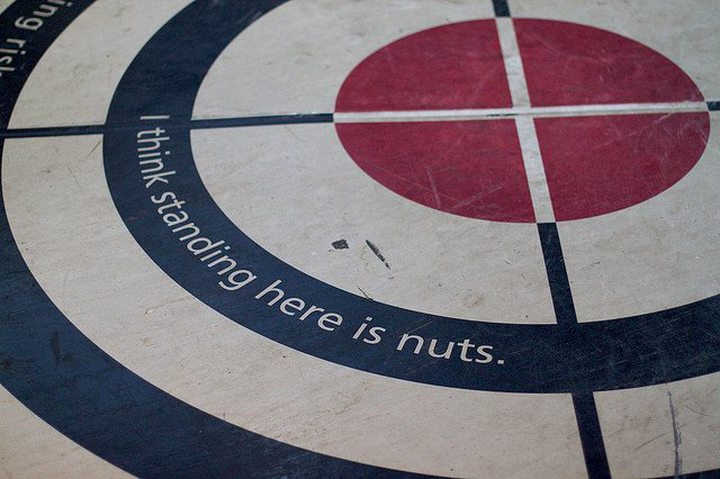The Science of Breaking Out of Your Comfort Zone (and Why You Should)

There's actually a lot of science that explains why it's so hard to break out of your comfort zone, and why it's good for you when you do it. With a little understanding and a few adjustments, you can break away from your routine and do great things.
The Science of Your "Comfort Zone," and Why It's So Hard to Leave It
Simply, your comfort zone is a behvioral space where your activities and behaviors fit a routine and pattern that minimizes stress and risk. It provides a state of mental security. You benefit in obvious ways: regular happiness, low anxiety, and reduced stress.
The idea of the comfort zone goes back to a classic experiment in psychology. Back in 1908, psychologists Robert M. Yerkes and John D. Dodson explained that a state of relative comfort created a steady level of performance In order to maximize performance, however, we need a state of relative anxiety—a space where our stress levels are slightly higher than normal. This space is called "Optimal Anxiety," and it's just outside our comfort zone. Too much anxiety and we're too stressed to be productive, and our performance drops off sharply.
The idea of optimal anxiety isn't anything new. Anyone who's ever pushed themselves to get to the next level or accomplish something knows that when you really challenge yourself, you can turn up amazing results. More than a few studies support the point. However, pushing too hard can actually cause a negative result, and reinforce the idea that challenging yourself is a bad idea. It's our natural tendency to return to an anxiety neutral, comfortable state. You can understand why it's so hard to kick your brain out of your comfort zone.
Even so, your comfort zone is neither a good or bad thing. It's a natural state that most people trend towards. Leaving it means increased risk and anxiety, which can have positive and negative results (which we'll get to in a moment), but don't demonize your comfort zone as something holding you back. We all need that head-space where we're least anxious and stressed so we can process the benefits we get when we leave it.
What You Get When You Break Free and Try New Things
Optimal anxiety is that place where your mental productivity and performance reach their peak. Still, "increased performance" and "enhanced productivity" just sound like "do more stuff." What do you really get when you're willing to step outside of your comfort zone?
- You'll be more productive. Comfort kills productivity because without the sense of unease that comes from having deadlines and expectations, we tend to phone it in and do the minimum required to get by. We lose the drive and ambition to do more and learn new things. We also fall into the "work trap," where we feign "busy" as a way to stay in our comfort zones and avoid doing new things. Pushing your personal boundaries can help you hit your stride sooner, get more done, and find smarter ways to work.
- You'll have an easier time dealing with new and unexpected changes. In this article at The New York Times, Brené Brown, a research professor at the University of Houston, explains that one of the worst things we can do is pretend fear and uncertainty don't exist. By taking risks in a controlled fashion and challenging yourself to things you normally wouldn't do, you can experience some of that uncertainty in a controlled, manageable environment. Learning to live outside your comfort zone when you choose to can prep you for life changes that force you out of it.
- You'll find it easier to push your boundaries in the future. Once you start stepping out of your comfort zone, it gets easier over time. This same NYT article explains that as you step out of your comfort zone, you'll become accustomed to that state of optimal anxiety. "Productive discomfort," as they call it, becomes more normal to you, and you're willing to push farther before your performance falls off. This idea is well illustrated in this infographic at Future Science Leaders. At the bottom, you'll see that as you challenge yourself, your comfort zone adjusts so what was difficult and anxiety-inducing becomes easier as you repeat it.
- You'll find it easier to brainstorm and harness your creativity. This is a soft benefit, but it's fairly common knowledge (and it's easily reproducible) that seeking new experiences, learning new skills, and opening the door to new ideas inspire us and educate us in a way that little else does. Trying new things can make us reflect on our old ideas and where they clash with our new knowledge, and inspire us to learn more and challengecomfirmation bias, our tendency to only seek out information we already agree with. Even in the short term, a positively uncomfortable experience can help us brainstorm, see old problems in a new light, and tackle the challenges we face with new energy.
The benefits you get after stepping outside of your comfort zone can linger. There's the overall self-improvement you get through the skills you're learning, the new foods you're trying, the new country you're visiting, and the new job you're interviewing for. There's also the soft mental benefits you get from broadening your horizons.
How to Break Out of Your Comfort Zone
Outside your comfort zone can be a good place to be, as long as you don't tip the scales too far. It's important to remember there's a difference between the kind of controlled anxiety we're talking about and the very real anxiety that many people struggle with every day. Everyone's comfort zone is different, and what may expand your horizons may paralyze someone else. Remember, optimal anxiety can bring out your best, but too much is a bad thing.
Here are some ways to break out (and by proxy, expand) your comfort zone without going too far:
- Do everyday things differently. Take a different route to work. Try a new restaurant without checking Yelp first. Go vegetarian for a week, or a month. Try a new operating system. Recalibrate your reality. Whether the change you make is large or small, make a change in the way you do things on a day-to-day basis. Look for the perspective that comes from any change, even if it's negative. Don't be put off if things don't work out the way you planned.
- Take your time making decisions. Sometimes slowing down is all it takes to make you uncomfortable—especially if speed and quick thinking are prized in your work or personal life. Slow down, observe what's going on, take your time to interpret what you see, and then intervene. Sometimes just defending your right to make an educated decision can push you out of your comfort zone. Think, don't just react.
- Trust yourself and make snap decisions. We're contradicting ourselves, but there's a good reason. Just as there are people who thrive on snap decisions, others are more comfortable weighing all of the possible options several times, over and over again.Sometimes making a snap call is in order, just to get things moving. Doing so can help you kickstart your personal projects and teach you to trust your judgement. It'll also show you there's fallout to quick decisions as well as slow ones.
- Do it in small steps. It takes a lot of courage to break out of your comfort zone. You get the same benefits whether you go in with both feet as you do if you start slow, so don't be afraid to start slow. If you're socially anxious, don't assume you have to muster the courage to ask your crush on a date right away, just say hello to them and see where you can go from there. Identify your fears, and then face them step by step.
There are lots of other ways to stretch your personal boundaries. You could learn a new language or skill. Learning a new language has multiple benefits, many of which extend to learning any new skill. Connect with people that inspire you, or volunteer with an organization that does great work. Travel, whether you go around the block or across the globe. If you've lived your whole life seeing the world from your front door, you're missing out. Visiting new and different places is perhaps one of the best ways to really broaden your perspectives, and it doesn't have to be expensive or difficult to do. The experiences you have may be mind-blowing or regrettable, but that doesn't matter. The point is that you're doing it, and you're pushing yourself past the mental blocks that tell you to do nothing.





